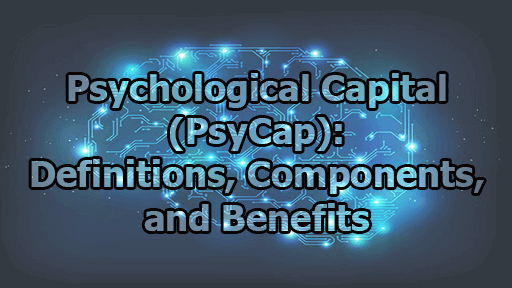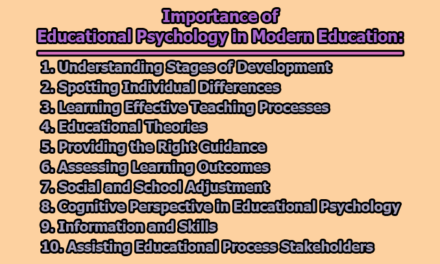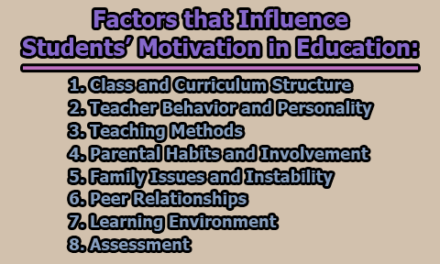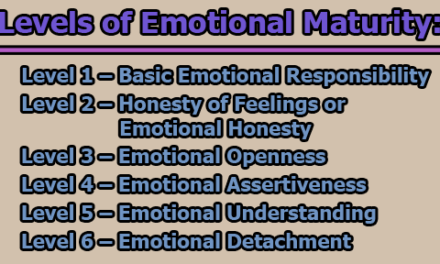Psychological Capital (PsyCap):
Organizations and educational institutions increasingly recognize the significance of positive psychological resources in a dynamic and competitive environment. Psychological Capital (PsyCap), a core construct in positive organizational behavior, is vital in enhancing individual and organizational performance (Luthans et al., 2007). PsyCap extends beyond traditional economic and human capital by focusing on an individual’s positive psychological state of development. This article provides an overview of the definitions, key components, and twelve significant benefits of Psychological Capital (PsyCap).
Definitions of Psychological Capital (PsyCap):
Psychological Capital (PsyCap) has been defined and interpreted from various perspectives by different scholars. At its core, PsyCap refers to an individual’s positive psychological state that contributes to their performance, well-being, and overall success.
According to Luthans, Youssef, and Avolio (2007), Psychological Capital is “an individual’s positive psychological state of development” characterized by self-efficacy, optimism, hope, and resilience. This definition highlights PsyCap as a developmental resource that can be nurtured and enhanced, distinguishing it from static traits like personality.
Luthans and Youssef (2004) describe PsyCap as “who you are” and “what you can become,” emphasizing the dynamic and developmental nature of these psychological resources. This perspective aligns PsyCap with growth and positive organizational behavior, suggesting that it can be expanded through intentional interventions and experiences.
Bandura (1997) focuses on the self-efficacy component within PsyCap, defining it as an individual’s belief in their ability to execute tasks successfully. He argues that self-efficacy is foundational because it influences motivation, persistence, and resilience. Thus, from Bandura’s viewpoint, Psychological Capital includes the confidence to overcome challenges and achieve goals.
Snyder (2000) introduces the concept of hope as a critical element of PsyCap, defining it as the combination of willpower (agency) and waypower (pathways) to achieve goals. This definition underscores the role of cognitive strategies and determination in shaping an individual’s ability to succeed, framing PsyCap as a resource that drives goal-directed behavior.
Carver and Scheier (2002) define optimism, another vital component of PsyCap, as the expectation of positive outcomes. They distinguish between dispositional optimism, a stable trait, and learned optimism, which aligns more closely with PsyCap as it can be developed and strengthened through experiences.
Masten and Reed (2002) add to the understanding of PsyCap by focusing on resilience, defining it as the ability to recover from adversity and adapt positively. Their perspective suggests that resilience is essential for managing stress, adapting to change, and bouncing back from setbacks, thereby enhancing performance and well-being.
From the above definitions, we can say that Psychological Capital is a dynamic, growth-oriented psychological resource composed of self-efficacy, optimism, hope, and resilience. It plays a pivotal role in personal and professional development by fostering positive attitudes, enhancing performance, and supporting well-being. PsyCap’s strength lies in its developmental nature, meaning that individuals and organizations can cultivate it through focused training, supportive environments, and goal-oriented strategies.
Components of Psychological Capital (PsyCap):
Psychological Capital (PsyCap) comprises four key components: self-efficacy, optimism, hope, and resilience. Each component plays a unique role in influencing an individual’s psychological state and performance outcomes. Together, they form a synergistic construct that supports personal and professional success. Scholars have widely discussed these components, highlighting their significance and developmental potential.
a) Self-Efficacy: Self-efficacy refers to an individual’s belief in their capacity to execute tasks successfully and achieve desired outcomes (Bandura, 1997). This component plays a pivotal role in motivating individuals to take on challenging tasks, persist in the face of adversity, and maintain confidence when confronted with difficulties. Luthans et al. (2007) emphasize that self-efficacy is foundational to PsyCap because individuals with high self-efficacy set higher goals, remain resilient, and demonstrate superior performance. Self-efficacy can be developed through mastery experiences, role modeling, positive feedback, and psychological arousal control.
b) Optimism: Optimism in PsyCap is defined as the realistic and flexible expectation that positive outcomes will occur (Carver & Scheier, 2002). Unlike dispositional optimism, which is viewed as a personality trait, optimism within PsyCap is developmental and influenced by context. Optimistic individuals attribute success to internal, stable, and global factors, while attributing failures to external, temporary, and situation-specific causes. This explanatory style boosts motivation, enhances persistence, and reduces negative emotions such as anxiety and depression. Seligman (1998) suggests that optimism can be cultivated through cognitive-behavioral techniques, reframing negative thoughts, and practicing gratitude.
c) Hope: Hope is conceptualized as a positive motivational state that consists of two key components: willpower (agency) and waypower (pathways) (Snyder, 2000). Willpower reflects an individual’s determination to achieve goals, while waypower refers to the ability to generate alternative pathways when confronted with obstacles. Hopeful individuals are more likely to persist despite setbacks because they believe in their ability to find multiple solutions. Luthans and Youssef (2004) highlight that hope is essential for goal attainment, as it fosters proactive planning and sustained motivation. Hope can be developed through goal-setting exercises, solution-focused coaching, and resilience training.
d) Resilience: Resilience is the capacity to recover from adversity, adapt positively to change, and maintain psychological well-being under stress (Masten & Reed, 2002). It involves not only bouncing back from setbacks but also learning and growing from those experiences. Resilient individuals display emotional strength, flexibility, and the ability to regulate their emotions effectively. According to Luthans et al. (2006), resilience is crucial for sustaining performance in challenging environments and can be enhanced through supportive social networks, stress management training, and fostering a growth mindset. Resilience enables individuals to remain adaptable and optimistic, even when faced with significant challenges.
Benefits of Psychological Capital (PsyCap):
Psychological Capital (PsyCap) offers numerous benefits that significantly impact individual well-being, organizational performance, and overall positive behavior. Research has identified twelve primary benefits that highlight the essential role of PsyCap in personal and professional contexts.
- Enhanced Well-Being: PsyCap contributes to improved psychological well-being by fostering positive emotions, reducing stress, and promoting mental health. Luthans et al. (2007) indicate that individuals with higher PsyCap experience greater life satisfaction, reduced burnout, and lower psychological distress. Self-efficacy, hope, optimism, and resilience collectively support adaptive coping strategies that enhance well-being.
- Improved Performance: High levels of PsyCap are strongly correlated with better job performance. According to Avey, Reichard, Luthans, and Mhatre (2011), employees with higher PsyCap demonstrate greater commitment, productivity, and effectiveness in their roles. The motivational aspects of self-efficacy and hope, combined with the positive outlook provided by optimism and resilience, drive superior performance outcomes.
- Increased Resilience: Resilience, as a core component of PsyCap, empowers individuals to recover quickly from setbacks. This benefit is particularly valuable in dynamic and challenging environments where adaptability is crucial. Masten and Reed (2002) highlight that resilient individuals are better equipped to manage change, maintain stability, and sustain performance under pressure.
- Boosted Optimism and Hope: Optimism and hope within PsyCap encourage individuals to anticipate positive outcomes and develop pathways to achieve their goals. Carver and Scheier (2002) emphasize that optimism enhances persistence, while Snyder (2000) asserts that hope increases the likelihood of achieving desired outcomes. Together, they promote a proactive and forward-looking mindset.
- Higher Self-Efficacy: Self-efficacy leads to increased confidence in one’s abilities, motivating individuals to take on challenges and achieve success. Bandura (1997) explains that individuals with strong self-efficacy are more likely to set ambitious goals, persist through obstacles, and maintain high performance levels. This confidence also reduces anxiety and enhances overall job satisfaction.
- Improved Attitudes: PsyCap fosters positive attitudes toward work, colleagues, and organizational goals. Avey et al. (2011) found that employees with higher PsyCap exhibit greater job satisfaction, engagement, and organizational commitment. Positive attitudes contribute to a more cohesive and collaborative work environment, enhancing overall organizational effectiveness.
- Reduced Negative Outlook: By promoting optimism, hope, and resilience, PsyCap reduces negative thoughts and emotions such as pessimism, anxiety, and depression. Seligman (1998) suggests that individuals with high PsyCap are less likely to ruminate on failures and more likely to focus on solutions, contributing to better mental health and emotional stability.
- More Positive Behaviors: PsyCap influences individuals to engage in constructive behaviors, such as helping colleagues, participating in team activities, and demonstrating leadership. Luthans and Youssef (2004) argue that positive psychological states lead to behaviors that enhance organizational culture and performance, fostering a supportive and productive work environment.
- Providing Short, Focused Training Sessions: One practical benefit of PsyCap is that it can be developed through brief, targeted training interventions. Luthans et al. (2006) demonstrated that short training sessions focusing on building hope, efficacy, resilience, and optimism (HERO) significantly enhance PsyCap levels. These interventions are cost-effective and yield substantial improvements in individual and organizational performance.
- Promoting Positive Organizational Behavior: PsyCap supports positive organizational behavior (POB), which emphasizes strengths, well-being, and performance. Luthans (2002) notes that organizations that cultivate PsyCap among employees experience higher engagement, better teamwork, and improved leadership effectiveness. PsyCap also contributes to a positive organizational climate, enhancing overall organizational success.
- Providing Periodic Coaching: Periodic coaching and mentoring programs focused on developing PsyCap components yield long-term benefits. Avey et al. (2010) highlight that coaching sessions aimed at enhancing self-efficacy, optimism, hope, and resilience improve employees’ ability to manage challenges and achieve goals. Coaching provides personalized feedback and support, facilitating continuous growth.
- Offering Health and Wellness Programs: Organizations that invest in health and wellness programs see enhanced PsyCap among employees. Such programs promote physical and psychological well-being, reduce stress, and foster resilience. Luthans et al. (2006) suggest that integrating wellness initiatives with PsyCap development strategies leads to a healthier, more engaged, and productive workforce.
It is apparent that Psychological Capital (PsyCap) is a vital resource in modern organizations and educational settings, offering various benefits ranging from enhanced well-being to improved performance and resilience. Its components—self-efficacy, optimism, hope, and resilience—are not only measurable but also developable through targeted interventions. By fostering PsyCap, organizations and institutions can cultivate a positive environment that enhances productivity, creativity, and overall success.
Frequently Asked Questions (FAQs):
What is Psychological Capital (PsyCap)?
Psychological Capital (PsyCap) is a positive psychological state characterized by self-efficacy, optimism, hope, and resilience. It represents an individual’s ability to overcome challenges and achieve goals by leveraging these psychological resources.
Why is PsyCap important in organizations?
PsyCap is crucial in organizations because it enhances employee well-being, job satisfaction, performance, and commitment. Higher PsyCap levels are associated with increased engagement and reduced turnover.
How can Psychological Capital be developed?
PsyCap can be developed through targeted interventions, such as short training sessions, coaching, and wellness programs. These activities focus on strengthening the four PsyCap components: self-efficacy, optimism, hope, and resilience.
What are the four components of PsyCap?
The four components are:
- Self-efficacy: Confidence in one’s ability to achieve goals.
- Optimism: Expectation of positive outcomes.
- Hope: Motivation and planning to achieve goals.
- Resilience: Ability to bounce back from adversity.
How does PsyCap differ from emotional intelligence?
While emotional intelligence focuses on recognizing and managing emotions in oneself and others, PsyCap emphasizes positive psychological capacities that promote success and well-being.
Can PsyCap impact organizational performance?
Yes. PsyCap positively correlates with organizational performance through enhanced employee productivity, teamwork, and leadership effectiveness.
Is PsyCap relevant in educational settings?
Absolutely. PsyCap supports students’ academic performance, motivation, and resilience in the face of academic challenges. Hope and self-efficacy are particularly critical for academic goal achievement.
How is PsyCap measured?
PsyCap is typically measured using the Psychological Capital Questionnaire (PCQ), which assesses self-efficacy, hope, optimism, and resilience levels.
What role does leadership play in developing PsyCap?
Leaders can foster PsyCap by creating a positive organizational climate, providing constructive feedback, and supporting employees through developmental programs.
Can PsyCap reduce workplace stress?
Yes. PsyCap enhances coping mechanisms, reduces negative emotions, and builds resilience, all of which help mitigate workplace stress.
References:
- Avey, J. B., Luthans, F., & Jensen, S. M. (2009). Psychological capital: A positive resource for combating employee stress and turnover. Human Resource Management, 48(5), 677-693. https://doi.org/10.1002/hrm.20294
- Avey, J. B., Reichard, R. J., Luthans, F., & Mhatre, K. H. (2011). Meta-analysis of the impact of positive psychological capital on employee attitudes, behaviors, and performance. Human Resource Development Quarterly, 22(2), 127-152. https://doi.org/10.1002/hrdq.20070
- Bandura, A. (1997). Self-efficacy: The exercise of control. W.H. Freeman.
- Carver, C. S., & Scheier, M. F. (2002). In C. R. Snyder & S. J. Lopez (Eds.), Handbook of positive psychology (pp. 231-243). Oxford University Press.
- Luthans, F. (2002) Positive Organizational Behavior: Developing and Managing Psychological Strengths. Academy of Management Executive, 16, 57-75. http://dx.doi.org/10.5465/AME.2002.6640181
- Luthans, F., & Youssef, C. M. (2004). Human, social, and now positive psychological capital management: Investing in people for competitive advantage. Organizational Dynamics, 33(2), 143-160. https://doi.org/10.1016/j.orgdyn.2004.01.003
- Luthans, F., Youssef, C. M., & Avolio, B. J. (2007). Psychological capital: Developing the human competitive edge. Oxford University Press.
- Luthans, F., Avey, J. B., Avolio, B. J., & Peterson, S. J. (2010). The development and resulting performance impact of positive psychological capital. Human Resource Development Quarterly, 21(1), 41-67. https://doi.org/10.1002/hrdq.20034
- Masten, A. S., & Reed, M. G. (2002). Resilience in development. In C. R. Snyder & S. J. Lopez (Eds.), Handbook of positive psychology (pp. 74-88). Oxford University Press.
- Peterson, S. J., & Luthans, F. (2003). The positive impact and development of hopeful leaders. Leadership & Organization Development Journal, 24(1), 26-31. https://doi.org/10.1108/01437730310457302
- Seligman, M. E. P. (1998). Learned optimism. New York: Pocket Books.
- Snyder, C. R. (2000). Handbook of hope: Theory, measures, and applications. Academic Press.

Library Lecturer at Nurul Amin Degree College










